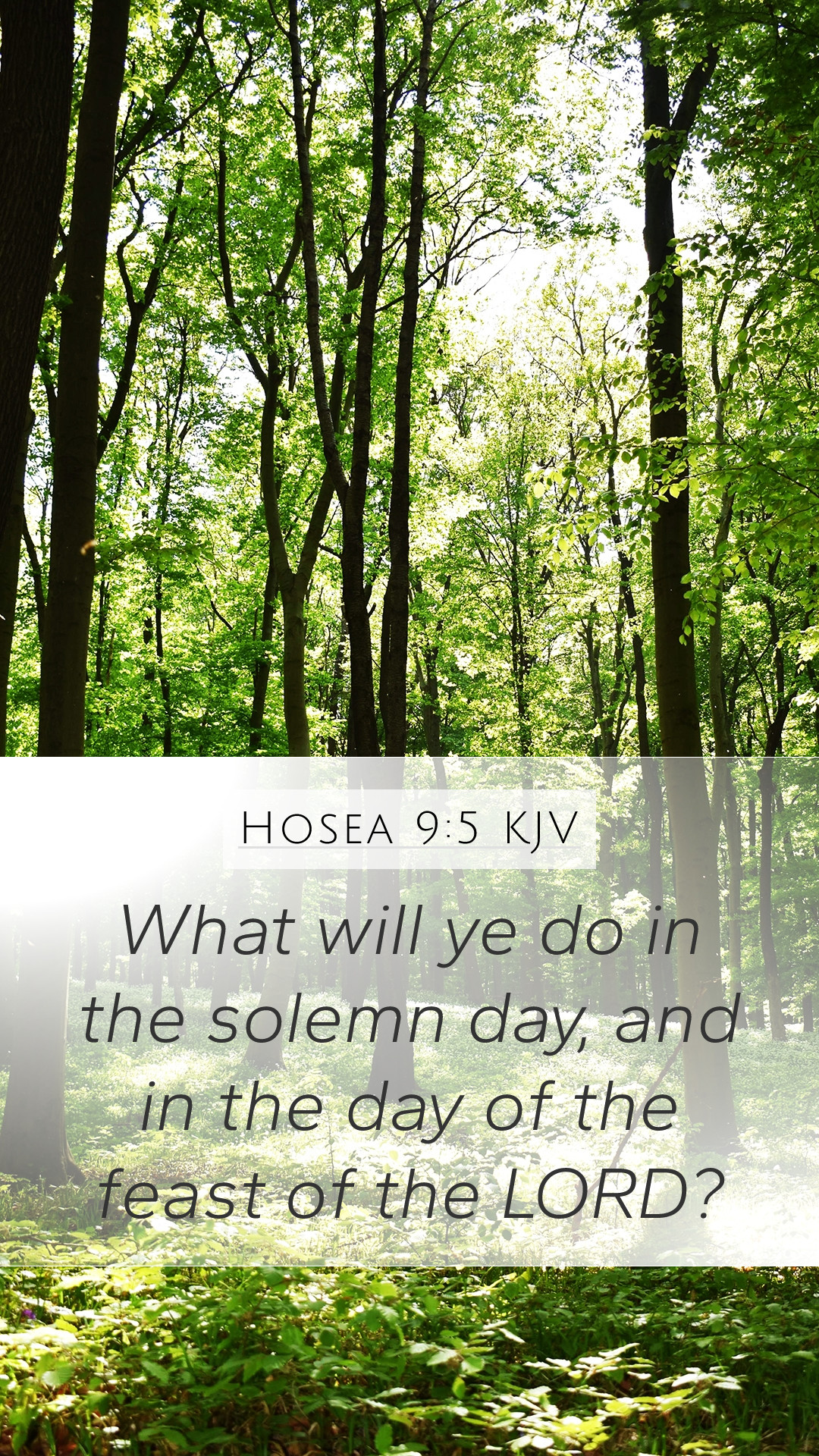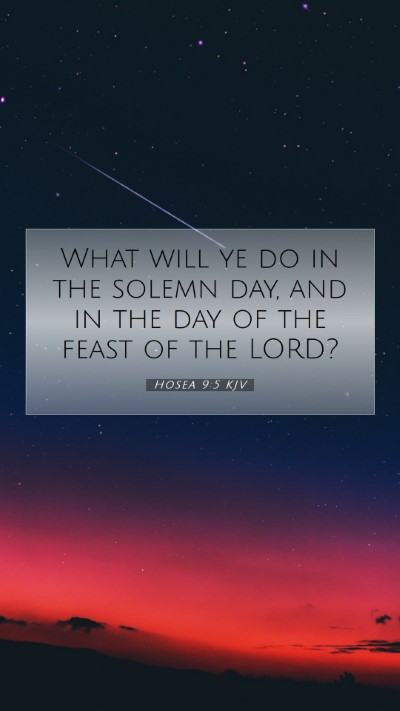Old Testament
Genesis Exodus Leviticus Numbers Deuteronomy Joshua Judges Ruth 1 Samuel 2 Samuel 1 Kings 2 Kings 1 Chronicles 2 Chronicles Ezra Nehemiah Esther Job Psalms Proverbs Ecclesiastes Song of Solomon Isaiah Jeremiah Lamentations Ezekiel Daniel Hosea Joel Amos Obadiah Jonah Micah Nahum Habakkuk Zephaniah Haggai Zechariah MalachiHosea 9:5 Meaning
What is the meaning of Hosea 9:5?
What will ye do in the solemn day, and in the day of the feast of the LORD?
Hosea 9:5 Bible Verse Meaning
Bible Verse Meaning: Hosea 9:5
Hosea 9:5 reads: "What will you do on the day of appointed festival, on the day of the feast of the LORD?" This verse raises significant questions regarding the response of the Israelites in the face of their impending judgment and loss of divine favor.
This verse is often interpreted within the context of Israel's idolatry and the consequent divine rebuke, emphasizing the futility of worship when separated from true obedience to God's commandments.
Insights from Public Domain Commentaries
-
Matthew Henry's Commentary:
Henry highlights that the prophet Hosea speaks to the people concerning their festivals and religious observances. He implies that their feasts, although outwardly significant, are rendered meaningless due to the underlying sin and disloyalty to God. The question posed serves as a solemn reminder of the disconnect between ritual practice and genuine faithfulness.
-
Albert Barnes' Notes:
Barnes elaborates on the notion that the appointed festivals, which should have been times of joy and recognition of God's goodness, will instead mark a time of despair as judgment approaches. He suggests that the question indicates a lack of true communion with God among the people, signifying that empty rituals cannot mask the reality of separation from God due to sin.
-
Adam Clarke's Commentary:
Clarke emphasizes the loss of sacred observances due to the people's unfaithfulness. He interprets the rhetorical question as an admonition, reminding the Israelites that their social and religious gatherings will not shield them from divine judgment. Clarke's exegesis points out that their festivals, once a source of joy, will become hollow without the presence of genuine repentance and relationship with God.
Comprehensive Analysis
In examining Hosea 9:5, it is crucial to engage in Biblical exegesis and consider:
- The Historical Context: This verse is set against the backdrop of Israel's mounting sin and rebellion, where the nation pursued idolatry, leading to a rift in their relationship with God.
- Theological Implications: The question invites readers to reflect on the nature of worship and the importance of a heart aligned with God's desires, rather than merely performing outward acts of piety.
- Practical Application: For modern readers, this serves as a warning against the trap of ritualism in their spiritual lives. Genuine faith must be coupled with corresponding actions that align with God's will.
Applications for Bible Study Groups
Numeric study groups may find this verse a rich avenue for discussion. Questions to explore could include:
- What does this verse reveal about the nature of worship in the light of sin?
- How can we ensure our spiritual practices remain meaningful in our lives today?
- What lessons can we derive on the importance of repentance and authenticity in our relationship with God?
Related Cross References
- Isaiah 1:13-14: Highlights the futility of empty offerings.
- Amos 5:21-24: God's rejection of Israel’s feasts due to injustice.
- Matthew 15:8-9: Jesus quotes Isaiah, pointing out that the people honor Him with their lips while their hearts are far from Him.
Conclusion
Understanding Hosea 9:5 provides significant insight into the importance of aligning one's heart with God, ensuring that worship goes beyond mere tradition to foster a genuine relationship with the Creator. The historical and spiritual lessons gleaned from this verse continue to resonate within the context of contemporary worship and daily Christian living.
As you explore Bible verse meanings and Bible verse interpretations, let the words of Hosea challenge you to reflect on the authenticity of your spiritual practices and the depth of your relationship with God. Engage with these insights for your next online Bible study or Bible study lessons to encourage deeper understanding among your peers.


